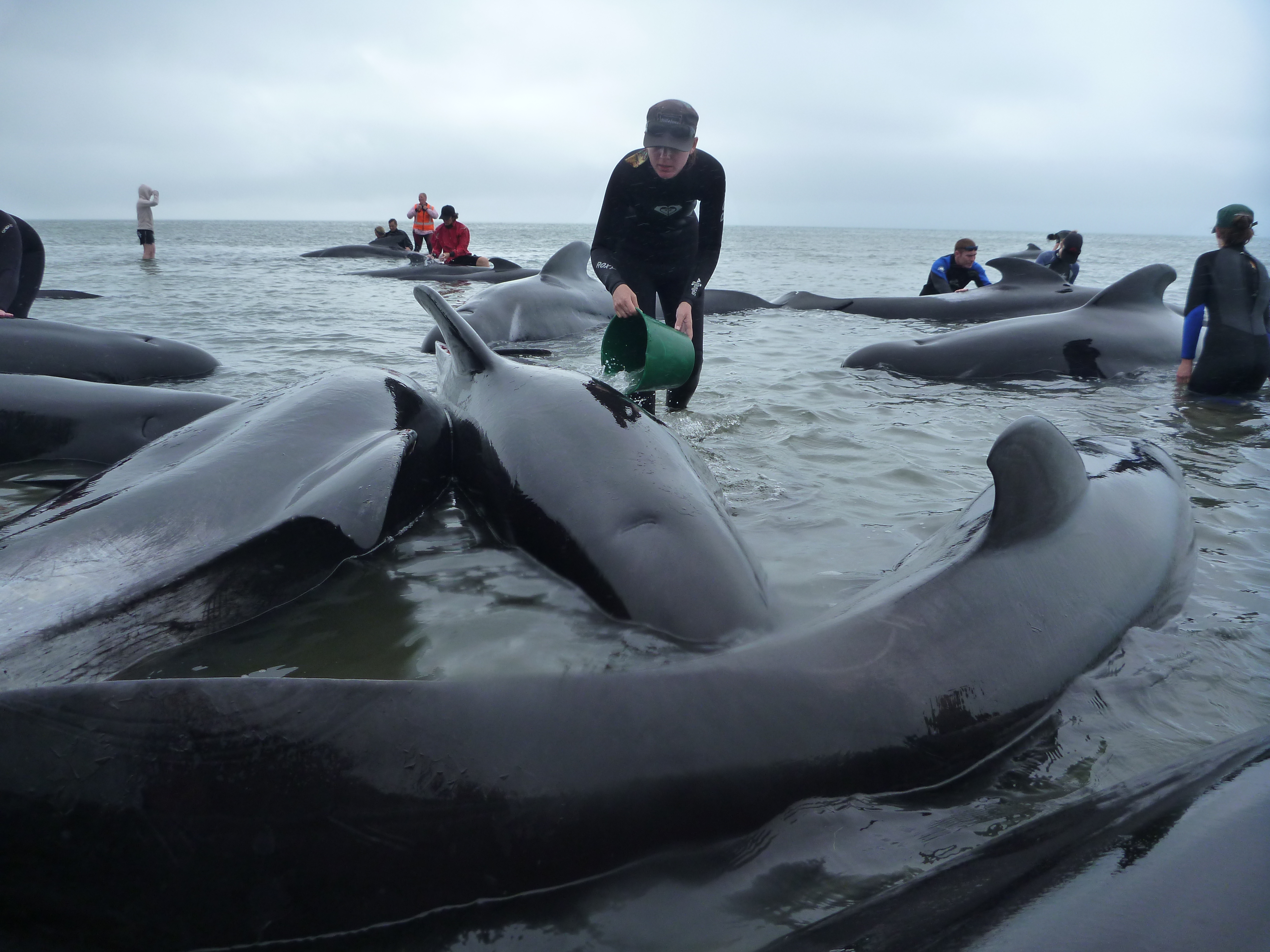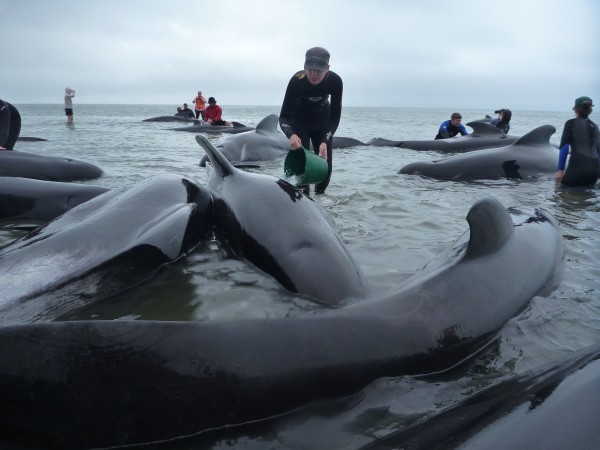In the last few weeks the news has been full of dead whales. We’ve had a pod of Pilot whales stranded in the Bay of Plenty. Before that two Cuvier’s Beaked whales, possibly mother and baby, were washed up at Maketu. A juvenile Humpback whale was washed up at Waikanae Beach. We’ve had dead rarities like Spectacled porpoises in separate incidents in Otago; a dead sperm whale and another rotten baleen whale, and today a Dwarf Sperm Whale, all washed up on the West Coast of Northland. Since February we’ve had at least 8 Orca deaths in two incidents, and other Pilot whales around the New Zealand coast. That’s a pretty grim tally and it’s not even counting cases where cause of death is known such as with the Bryde’s whale dead from ship strike, and countless smaller dolphins found dead or killed throughout the year.
Putting aside the propensity for Pilot Whales to strand in any circumstances, and the fact that we’re hearing about more live whales as well, the spate of unexplained whale deaths is leaving conservationists concerned. The head of Project Jonah now says we’ve got the highest rates of whale stranding in the world.
There’s speculation about the cause of death of all these much loved majestic animals, and pathology analysis usually fails to provide clear answers. Even when samples from dead animals are retrieved, refrigerating them damages evidence, impacts are hard to determine. Questions remain unanswered.
Explanations proposed by the concerned public include the obvious bogeyman of seismic testing – given that most of the country’s EEZ has now been opened up for oil, gas and mineral prospecting. Because many of the whales washed up dead are in poor condition, other theories include death from starvation caused by overfishing or ingesting plastic. Ship strike is sometimes suspected even if there’s not clear evidence. Sometimes the evidence is impossible to find, because of the state of decay in the animal concerned, or just the challenges performing a necropsy on a twenty tonne animal.
The Department of Conservation makes pathology reports available on their website, but they don’t tell us much. What we can know, is that there are massive pressures on our marine mammals. New Zealand has 34 of the World’s 76 cetaceans, but we know more about dead Cuvier’s Beaked whales than we do about the living.
Whale and dolphin tourism is directly worth about $120 million to the New Zealand economy. As inhabitants of Oceania ourselves, we Kiwis love the sea and love our marine mammals. We all have a stake, and collectively mourn the strandings of whales. A more pitiful and poignant sight cannot be found. Picture the images of everyday New Zealanders trying to refloat stranded whales as a reflection of our collective care.
Basically we don’t really know what’s up with the whales, but with the increase in stressors such as ocean noise, ship activity, pollution and heavy metals (NZ cetaceans have the highest concentrations of Persistent Organochlorine Contaminants in the world) life can’t be easy for them. Add overfishing and seismic testing and we have a real suite of potential threats.
Whales and dolphins have survived in the world’s waters for millions of years. But we already reduced some species to just hundreds of individuals. With the end of (most) whaling, they’ve had a chance to recover. 50% of the world’s species have been wiped out within the last 40 years. What hope is there for the whales amidst the perils of the Anthropocene?







Fortunately for the whales humans are going extinct, unfortunately for the whales we will take them with us.
Since RELIABLE data for whale beachings in NZ is probably only half a century old, do you have any evidence whatsoever that periods of high beaching rates have NOT occurred in NZs past, especially precolonisation? I know that 1,000+ year old Australian Aboriginal rock paintings regularly portray whale beachings, which suggest these animals, possibly for reasons only known to themselves, do NATURALLY beach themselves. Why do they do that?
Are rates only higher because of increases in human population density along coastlines thus increasing the reported cases- i.e. we discover/report the beachings more reliably now – or is the rate genuinely high? i.e. How many beachings might have gone unreported in the past? These sort of statistics can’t be analysed over just a few years, which will always show peaks and troughs (e.g. see NZ road toll data over holiday weekends), but rather needs to be analysed over decades to accurately demonstrate reliable trends.
“which suggest these animals, possibly for reasons only known to themselves, do NATURALLY beach themselves”…surely you’re not suggesting these mammals are suicidal, as Walt Disney would have us believe of cliff jumping lemmings. My understanding is that suicide is very rare in the animal kingdom, mass suicide ever more so.
Your rebuttal arguments for lack of data are logically sound but, to my ear, are far too reminiscent of the tobacco lobby’s plea for more evidence smoking kills people. We know cetaceans are in trouble, so the only data we need is on ways to save them.
Firstly, I never used the word “suicide”, but you just shoved that into your reply anyway. Clearly whales can and do beach themselves due to purely natural circumstances (in addition to possible man-made conditions), because like I said they have been documented doing this for THOUSANDS of years. That is an actual fact. The reasons for this are far from clear.
My rebuttal is solely coming from my innate desire (as an actual scientist) to unravel the bullshit from the truth… the thing is I frankly don’t care if unproven bullshit is coming from the left or right – they both smell the same to me. The blog-entry looks on the surface to potentially (deliberately?) promote readers to confuse correlation with causation, without anything concrete to back that up. Observational science just isn’t that simple. It generally requires many, many years of data (the more the better) and requires VERY careful analysis. I’m just not seeing that here, which renders it more of a propaganda piece rather than a genuine thing we can (and must) do something about right now.
I’m not making any assumptions about causation. I’m just talking about questions that are asked in the absence of evidence either way
You did say “possibly for reasons only known to themselves, do NATURALLY beach themselves.” which implies they know a reason for beaching themselves. I said “surely you’re not suggesting these mammals are suicidal,” which implies that’s not what you meant. Semantics, I know.
You ignored my point about the toccabo lobby using the excuse of more data being required to prove smoking kills people. Seems to me you’re using the same argument that not enough is known about beaching so we don’t have to try and do anything about it.
Indeed I did say that. I was more thinking along the lines of them collectively being drawn to a whale in distress, for example, as opposed to some sort of suicidal cult (which we, as humans, incidentally do undertake with similarly size brains).
Big tobacco has nothing to do with this, and you know it. The tobacco industry is well-known as a special kind of evil since they themselves sat on the very data that would later hang them. That sort of characterisation can’t be found at this stage (as far as I’m aware) around whale beachings.
We can talk about these beachings until we are blue in the face, but the fact is that we don’t know much about why they’re doing it, either now or in millenniums past (unless, of course, if you KNOW corporations are sitting on data that says otherwise). Bringing up some random possibilities without any concrete evidence to back it up is imo doing readers a disservice – it can incite fear and distrust in industries where none may be justified (at least in regard to this topic).
And for the record, I’m 100% against any deep-sea drilling and fracking in New Zealand, but NOT because they MIGHT have an adverse effect on whale behaviour.
While agreeing with much of what you’re saying, I do wish there was more research on the reasons for beaching. Unfortunately I suspect corporations have little interest in funding research which may prove sonic disturbance, water pollution, over fishing, vessel propeller strikes, climate abnormalities, or changes in the earth’s magnetic field, etc. may now be causing an increased (data required) number of beaching.
Humour, forewarned:
Maybe so many whales are beaching, because one “Whaleoil” spewed into the ocean, after a night out, not so long ago, poisoning them, leading at least to intoxication and thus disorientation???
It’s really sad. Thanks for the article. There needs to be more of an action plan and list of causes. Sounds like climate change – too many lobby groups wanting this issue ignored and not enough lobby groups/organized individuals concentrating effort to actually do something real to stop the decline.
Comments are closed.